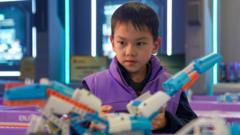As China invests heavily in artificial intelligence advancements, the nation witnesses a surge in AI applications—from educational robots enriching children's learning experiences to sophisticated chatbots gaining international attention. Amidst rising ambitions, concerns about data privacy and government oversight linger, shaping the trajectory of this technological revolution.
AI Takes Center Stage in China's Tech Revolution

AI Takes Center Stage in China's Tech Revolution
From chatbots to innovative educational tools, China is making significant strides in artificial intelligence, paving the way for a new era of tech dominance.
Article Text:
In a cozy Beijing apartment, eight-year-old Timmy was lost in a game of chess against a small robot powered by artificial intelligence. This wasn't a state-of-the-art lab; it was simply part of Timmy's home. "It's like a little teacher or a little friend," he exclaimed as he discussed strategies with the robot before it congratulated him on winning. This exemplifies China's shift towards integrating AI into daily life, as the country sets its sights on becoming a leading tech superpower by 2030.
China's ambitions were evidenced in January with the impressive launch of DeepSeek, a chatbot that caught the global spotlight. The nation is pouring investments into gaining an edge in AI, as over 4,500 companies are currently developing AI technologies. Educational institutions are also adapting, with plans to introduce AI-focused curriculums, underscoring a societal shift towards early AI assimilation.
Timmy’s mother, Yan Xue, emphasized the importance of embracing AI, reflecting a broader sentiment in China where AI is viewed as an integral future component. The government backing is palpable, with plans for a colossal investment of 10 trillion yuan ($1.4 trillion) over the next 15 years in AI developments, especially in response to mounting trade tensions with the U.S.
The techniques and capabilities of Chinese AI firms, like SenseRobot, are turning heads both locally and abroad. Tommy Tang, a representative from the company, shared insights into the response he's garnered selling chess-playing robots at various events, revealing the astonishment of consumers upon learning these innovations are made in China.
In the field of education, projects like Whalesbot’s coding toys illustrate China's focus on nurturing a new generation of tech-savvy individuals. With STEM graduates numbering over 3.5 million annually, China is harnessing its youth to stay competitive in global technology.
While the success of DeepSeek has propelled the narrative of China’s AI capabilities, it has also spurred scrutiny abroad concerning privacy and data security. Concerns loom over potential governmental access to user data from popular apps like TikTok, prompting reactions from countries such as South Korea and Australia to restrict its usage on government devices.
Despite these challenges, a spirit of innovation pervades within China’s AI firms. By streamlining the engineering process through advanced AI techniques, companies like SenseRobot are reducing production costs significantly. They actively promote technological self-sufficiency as a national goal, with a commitment to developing independent advanced chips.
As China strides forward in the AI arena, its advances are remarkable yet tempered with caution. The journey is long and filled with challenges, as President Xi Jinping emphasizes the necessity of persistent effort to secure a lead in this technological marathon. China remains undeterred, interpreting the recent AI breakthroughs as a stepping stone towards a future where AI fundamentally reshapes society.
In a cozy Beijing apartment, eight-year-old Timmy was lost in a game of chess against a small robot powered by artificial intelligence. This wasn't a state-of-the-art lab; it was simply part of Timmy's home. "It's like a little teacher or a little friend," he exclaimed as he discussed strategies with the robot before it congratulated him on winning. This exemplifies China's shift towards integrating AI into daily life, as the country sets its sights on becoming a leading tech superpower by 2030.
China's ambitions were evidenced in January with the impressive launch of DeepSeek, a chatbot that caught the global spotlight. The nation is pouring investments into gaining an edge in AI, as over 4,500 companies are currently developing AI technologies. Educational institutions are also adapting, with plans to introduce AI-focused curriculums, underscoring a societal shift towards early AI assimilation.
Timmy’s mother, Yan Xue, emphasized the importance of embracing AI, reflecting a broader sentiment in China where AI is viewed as an integral future component. The government backing is palpable, with plans for a colossal investment of 10 trillion yuan ($1.4 trillion) over the next 15 years in AI developments, especially in response to mounting trade tensions with the U.S.
The techniques and capabilities of Chinese AI firms, like SenseRobot, are turning heads both locally and abroad. Tommy Tang, a representative from the company, shared insights into the response he's garnered selling chess-playing robots at various events, revealing the astonishment of consumers upon learning these innovations are made in China.
In the field of education, projects like Whalesbot’s coding toys illustrate China's focus on nurturing a new generation of tech-savvy individuals. With STEM graduates numbering over 3.5 million annually, China is harnessing its youth to stay competitive in global technology.
While the success of DeepSeek has propelled the narrative of China’s AI capabilities, it has also spurred scrutiny abroad concerning privacy and data security. Concerns loom over potential governmental access to user data from popular apps like TikTok, prompting reactions from countries such as South Korea and Australia to restrict its usage on government devices.
Despite these challenges, a spirit of innovation pervades within China’s AI firms. By streamlining the engineering process through advanced AI techniques, companies like SenseRobot are reducing production costs significantly. They actively promote technological self-sufficiency as a national goal, with a commitment to developing independent advanced chips.
As China strides forward in the AI arena, its advances are remarkable yet tempered with caution. The journey is long and filled with challenges, as President Xi Jinping emphasizes the necessity of persistent effort to secure a lead in this technological marathon. China remains undeterred, interpreting the recent AI breakthroughs as a stepping stone towards a future where AI fundamentally reshapes society.





















